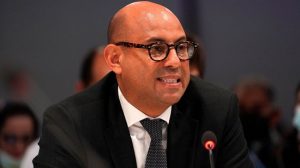The Global Stocktake is a critical turning point in mankind‘s battle against the escalating climate crisis – a moment to take a long, hard look at the state of the planet and chart a better course for the future.

“The global stocktake is an ambition exercise. It’s an accountability exercise. It’s an acceleration exercise,” said UN Climate Change Executive Secretary, Simon Stiell.
“It’s an exercise that is intended to make sure every Party is holding up their end of the bargain, knows where they need to go next and how rapidly they need to move to fulfill the goals of the Paris Agreement,” he added.
The global stocktake is a process for countries and stakeholders to see where they’re collectively making progress towards meeting the goals of the Paris Climate Change Agreement – and where they’re not.
It’s like taking inventory. It means looking at everything related to where the world stands on climate action and support, identifying the gaps, and working together to chart a better course forward to accelerate climate action.
The stocktake takes place every five years, with the first-ever stocktake scheduled to conclude at the UN Climate Change Conference (COP28) by the end of 2023.
But this is not just a routine check-up. Stiell calls the stocktake a “moment for course correction,” an opportunity to ramp up ambition to avoid the worst consequences of climate change. The stocktake itself isn’t the gamechanger – it’s the global response to it that will make all the difference.
Stiell’s ideal outcome from the stocktake? A roadmap with “solutions pathways“ that drive immediate action. Pathways that guide us sector by sector, region by region, actor by actor, to get to where we need to go during the next seven years.
“The global stocktake will end up being just another report unless governments and those that they represent can look at it and ultimately understand what it means for them and what they can and must do next. It’s the same for businesses, communities and other key stakeholders,” stated Stiell.
